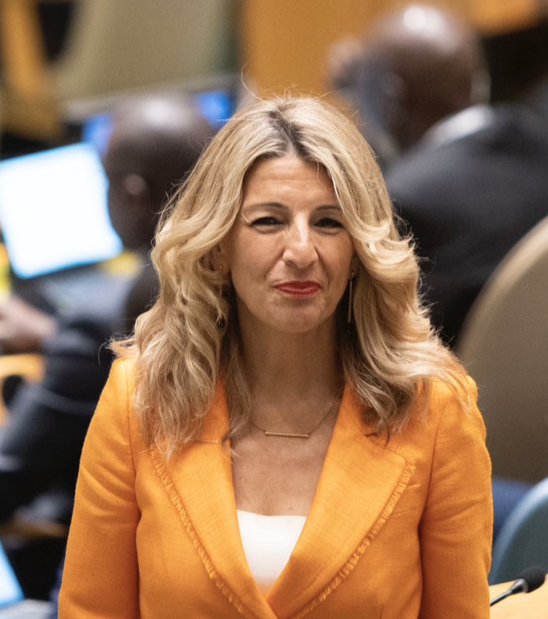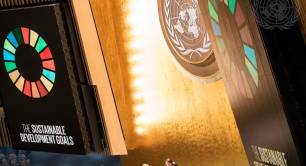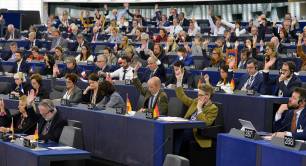‘Historic moment’ for social enterprise as UN adopts resolution on social and solidarity economy
Supporters of United Nations resolution predict it will lead to global recognition for the role of social enterprises, cooperatives and others in building sustainable economies.
The United Nations General Assembly yesterday agreed its first ever resolution on the social and solidarity economy. The resolution, adopted at a meeting in New York, encourages member states and financial institutions to promote and support the work of social enterprises, cooperatives and others to achieve sustainable development.
 The resolution was presented to the UN General Assembly by Yolanda Diaz (pictured), second vice president of Spain and the country’s minister of work and the social economy. It was adopted by consensus, without a vote.
The resolution was presented to the UN General Assembly by Yolanda Diaz (pictured), second vice president of Spain and the country’s minister of work and the social economy. It was adopted by consensus, without a vote.
“This pioneering resolution offers the tools to confront the great challenges that humanity faces – the reduction of inequalities and the protection of the environment,” she said at the meeting.
“An economy that is more democratic, more rooted in its territory and strong in the face of crisis is possible,” she said. “The social economy is our today and our tomorrow.”
The UN Inter-Agency Task Force on Social and Solidarity Economy said that the vote was a “historic moment for the social and solidarity economy”.
Definitions and encouragement
The resolution, Promoting the Social and Solidarity Economy for Sustainable Development, provides a definition for the social and solidarity economy and recognises the role that it can play in achieving the UN’s Sustainable Development Goals.
It defines the social and solidarity economy as encompassing cooperatives, associations, mutual societies, foundations, social enterprises, self-help and voluntary groups.
It encourages the UN’s 193 member states to introduce policies and legislation to support the social and solidarity economy. And it calls on financial institutions, including development banks, to support the social and solidarity economy through existing and new financial instruments and mechanisms.
It also contains a request for the UN secretary-general to prepare a report on the implementation of the resolution with the help of the UN Task Force on the Social and Solidarity Economy.
‘Global recognition’ for the social and solidarity economy
 Ariel Guarco, president of the International Cooperative Alliance, said: “This is a historic moment for the social and solidarity economy family.”
Ariel Guarco, president of the International Cooperative Alliance, said: “This is a historic moment for the social and solidarity economy family.”
He added: “We believe the resolution will be a key instrument in increasing the visibility of the social and solidarity economy and providing the opportunity for a focused exchange of knowledge and learning by member states, guiding UN agencies on social and solidarity economy priority areas of work and documenting our contributions to sustainable development.”
The resolution will be a key instrument in increasing the visibility of the social and solidarity economy
The International Labour Organization’s director general, Gilbert F Houngbo, said: “The social and solidarity economy is now, rightfully, getting global recognition for the part it can play in shaping a sustainable, just and resilient future for us all.”
 Francois Bonnici, director of the Schwab Foundation and head of social innovation at the World Economic Forum (pictured), said: "Social innovators, social entrepreneurs and other purpose-first businesses have been promoting and contributing to sustainable development for decades. It is fantastic news that this is now recognised in a UN resolution."
Francois Bonnici, director of the Schwab Foundation and head of social innovation at the World Economic Forum (pictured), said: "Social innovators, social entrepreneurs and other purpose-first businesses have been promoting and contributing to sustainable development for decades. It is fantastic news that this is now recognised in a UN resolution."
Kerryn Krige, an academic specialising in social entrepreneurship based at The Marshall Institute at the LSE in London, wrote on LinkedIn: “I’m so excited by this. It is so gratifying to see the political will that has been built around social entrepreneurship and the social and solidarity economy. This is a hugely significant milestone which firmly establishes the social and solidarity economy as a mainstream, legitimate social, economic and environmental model.”
Krige pointed out that 10 or 15 years ago the narrative was a “repeating loop answering the questions, what is social entrepreneurship? Why is it important?...With this recognition, the conversation firmly shifts to the initiatives, projects and institutional mechanisms that enable the how.”
The resolution was put forward by Belgium, Canada, Chile, Colombia, Costa Rica, Dominican Republic, Equatorial Guinea, France, Hungary, Italy, Luxembourg, Morocco, Senegal, Slovenia and Spain.
Header photo: Yolanda Diaz presenting the resolution at the United Nations meeting in New York on 18 April.
Thanks for reading our stories. As an entrepreneur or investor yourself, you'll know that producing quality work doesn't come free. We rely on our subscribers to sustain our journalism – so if you think it's worth having an independent, specialist media platform that covers social enterprise stories, please consider subscribing. You'll also be buying social: Pioneers Post is a social enterprise itself, reinvesting all our profits into helping you do good business, better.



